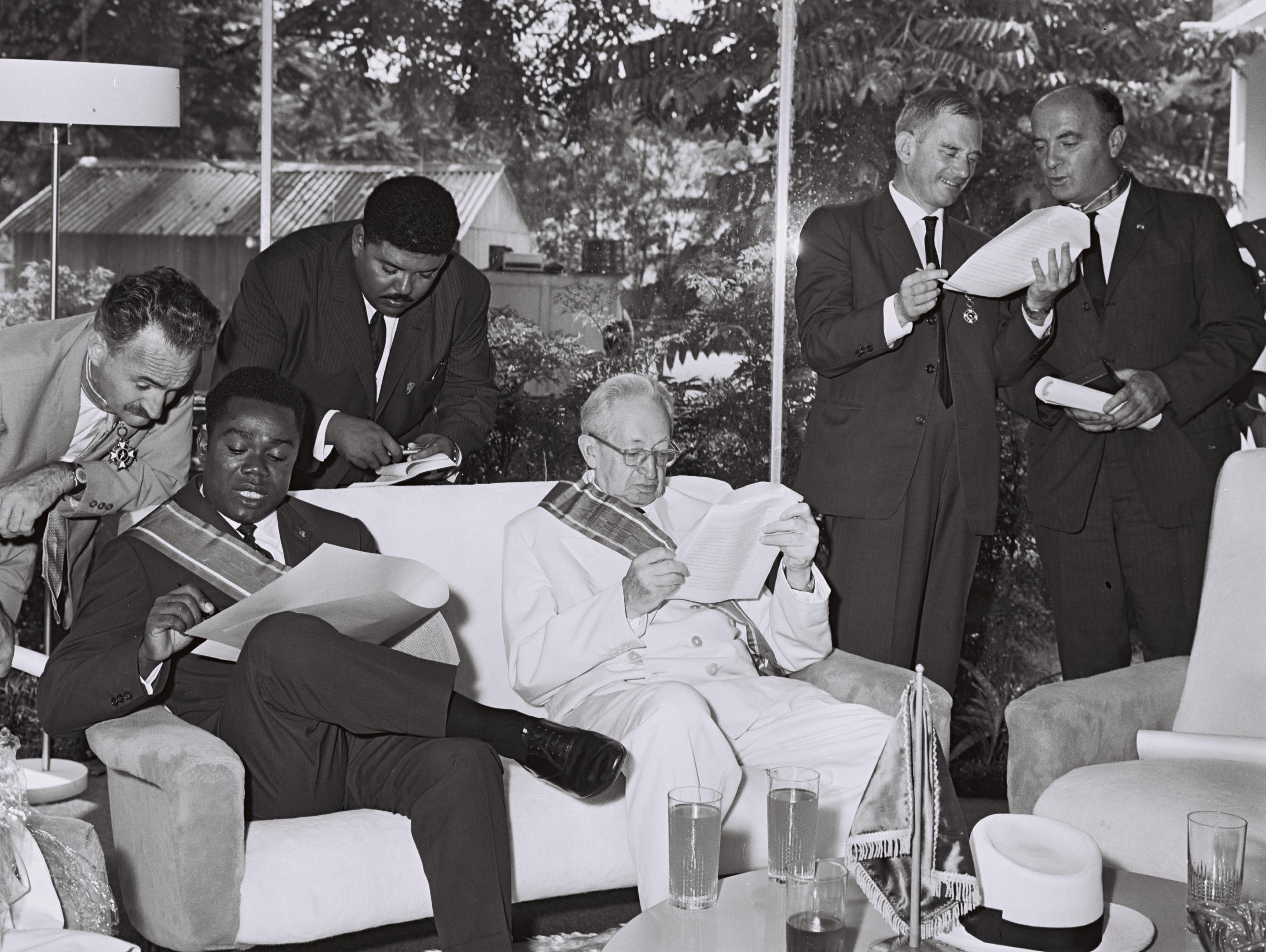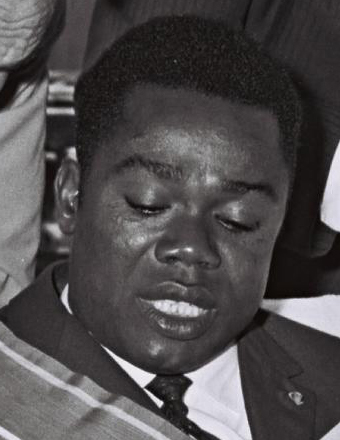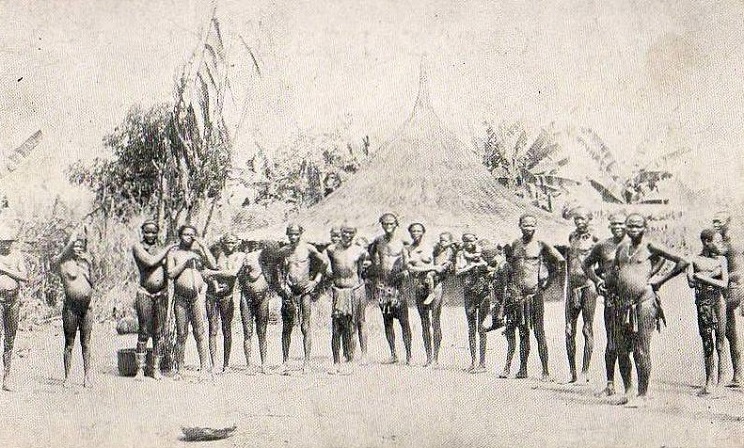|
Alexandre Banza
Lieutenant Colonel Alexandre Banza (10 October 1932 – 12 April 1969) was a military officer and politician in the Central African Republic. Born in Carnot, Ubangi-Shari, Banza served with the French Army during the First Indochina War before joining the Central African Republic armed forces. As commander of the Camp Kassaï military base in 1965, Banza helped Jean-Bédel Bokassa overthrow the government of President David Dacko. Bokassa rewarded Banza by appointing him as minister of state and minister of finance in the new government. Banza quickly established the new regime's reputation abroad and forged diplomatic relations with other countries. In 1967, Bokassa and his protégé had a major argument over the president's extravagances. In April 1968, Bokassa removed Banza as minister of finance. Recognizing Bokassa's attempts to undermine him, Banza made a number of remarks highly critical of the president's handling of the government. Bokassa responded by abolishing ... [...More Info...] [...Related Items...] OR: [Wikipedia] [Google] [Baidu] |
Carnot, Central African Republic
Carnot is a city located in the south west of the Central African Republic (CAR), in the prefecture of Mambéré-Kadéï. It has a population of 54,551 (2012 census), making it the fourth largest city in CAR by population, and the second largest city of the prefecture after Berbérati. The city takes its name as a tribute to the assassinated French President Sadi Carnot. The city is situated on the eastern bank of the Mambéré river, and is served by Carnot Airport. Yams, cassava, and cotton are cultivated, and cattle are reared in the area. The region lacks a functioning health service and is affected by an extremely high mortality rate and a high disease burden of malaria, HIV and tuberculosis. History In 1894, François Joseph Clozel founded a French military post near the village of Tendira. The locality was given the name ''Carnot'' in homage to the French president assassinated in 1894: Sadi Carnot (1837-1894). In 1902, the town became home to the 5th company of t ... [...More Info...] [...Related Items...] OR: [Wikipedia] [Google] [Baidu] |
David Dacko
David Dacko (; 1927 – 21 November 2003) was a Central African politician who served as the first president of the Central African Republic from 14 August 1960 to 1 January 1966, and 3rd President from 21 September 1979 to 1 September 1981. After his second removal from power in a ''coup d'état'' led by General André Kolingba, he pursued an active career as an opposition politician and presidential candidate with many loyal supporters; Dacko was an important political figure in the country for over 50 years. Early life and education Dacko was born in the village of Bouchia, near Mbaïki in the Lobaye region, which was then a part of the French Equatorial African territory of Ubangi-Shari to Joseph Iniabodé and Marie Okolania. His parents belonged to the same ethnic group. A M'Baka (Ngbaka), he was a distant cousin of future rival Jean-Bédel Bokassa. Soon after Dacko's birth, his family moved to Boda, where his father worked in a store belonging to a European coffee planter ... [...More Info...] [...Related Items...] OR: [Wikipedia] [Google] [Baidu] |
List Of Heads Of State Of The Central African Republic And Central African Empire
This article lists the heads of state of the Central African Republic. There have been seven heads of state of the Central African Republic and the Central African Empire since independence was obtained from the French on 13 August 1960. This list includes not only those persons who were sworn into office as President of the Central African Republic but also those who served as ''de facto'' heads of state. Jean-Bédel Bokassa served as a ''de facto'' head of state (and also reigned as Emperor from 1976 to 1979), while David Dacko (who served as ''de facto'' head of state from 1979 to 1981), André Kolingba, Ange-Félix Patassé, and François Bozizé were elected into office at some point during their tenure. To date, Kolingba is the only former head of state of the Central African Republic to voluntarily step down from the office through a democratic process, following the 1993 general election. The current President of the Central African Republic is Faustin-Archange Touad� ... [...More Info...] [...Related Items...] OR: [Wikipedia] [Google] [Baidu] |
Transmission (telecommunications)
In telecommunications, transmission is the process of sending or propagating an analog or digital signal via a medium that is wired, wireless, or fiber-optic. Transmission technologies typically refer to physical layer protocol duties such as modulation, demodulation, line coding, equalization, error control, bit synchronization and multiplexing, but it may also involve higher-layer protocol duties, for example, digitizing an analog signal, and data compression. Transmission of a digital message, or of a digitized analog signal, is known as data transmission. Examples of transmission are the sending of signals with limited duration, for example, a block or packet of data, a phone call, or an email. See also *Radio transmitter In electronics and telecommunications, a radio transmitter or just transmitter is an electronic device which produces radio waves with an antenna. The transmitter itself generates a radio frequency alternating current, which is applied to the ... [...More Info...] [...Related Items...] OR: [Wikipedia] [Google] [Baidu] |
Tunisia
) , image_map = Tunisia location (orthographic projection).svg , map_caption = Location of Tunisia in northern Africa , image_map2 = , capital = Tunis , largest_city = capital , coordinates = , official_languages = Arabic Translation by the University of Bern: "Tunisia is a free State, independent and sovereign; its religion is the Islam, its language is Arabic, and its form is the Republic." , religion = , languages_type = Spoken languages , languages = Minority Dialects : Jerba Berber (Chelha) Matmata Berber Judeo-Tunisian Arabic (UNESCO CR) , languages2_type = Foreign languages , languages2 = , ethnic_groups = * 98% Arab * 2% Other , demonym = Tunisian , government_type = Unitary presidential republic , leader_title1 = President , leader_name1 = Kais Saied , leader_ti ... [...More Info...] [...Related Items...] OR: [Wikipedia] [Google] [Baidu] |
Morocco
Morocco (),, ) officially the Kingdom of Morocco, is the westernmost country in the Maghreb region of North Africa. It overlooks the Mediterranean Sea to the north and the Atlantic Ocean to the west, and has land borders with Algeria to the east, and the disputed territory of Western Sahara to the south. Mauritania lies to the south of Western Sahara. Morocco also claims the Spanish exclaves of Ceuta, Melilla and Peñón de Vélez de la Gomera, and several small Spanish-controlled islands off its coast. It spans an area of or , with a population of roughly 37 million. Its official and predominant religion is Islam, and the official languages are Arabic and Berber; the Moroccan dialect of Arabic and French are also widely spoken. Moroccan identity and culture is a mix of Arab, Berber, and European cultures. Its capital is Rabat, while its largest city is Casablanca. In a region inhabited since the Paleolithic Era over 300,000 years ago, the first Moroccan s ... [...More Info...] [...Related Items...] OR: [Wikipedia] [Google] [Baidu] |
Gabon
Gabon (; ; snq, Ngabu), officially the Gabonese Republic (french: République gabonaise), is a country on the west coast of Central Africa. Located on the equator, it is bordered by Equatorial Guinea to the northwest, Cameroon to the north, the Republic of the Congo on the east and south, and the Gulf of Guinea to the west. It has an area of nearly and its population is estimated at million people. There are coastal plains, mountains (the Cristal Mountains and the Chaillu Massif in the centre), and a savanna in the east. Since its independence from France in 1960, the sovereign state of Gabon has had three presidents. In the 1990s, it introduced a multi-party system and a democratic constitution that aimed for a more transparent electoral process and reformed some governmental institutions. With petroleum and foreign private investment, it has the fourth highest HDI in the region (after Mauritius, Seychelles and South Africa) and the fifth highest GDP per capita (PPP) i ... [...More Info...] [...Related Items...] OR: [Wikipedia] [Google] [Baidu] |
French Army
The French Army, officially known as the Land Army (french: Armée de Terre, ), is the land-based and largest component of the French Armed Forces. It is responsible to the Government of France, along with the other components of the Armed Forces. The current Chief of Staff of the French Army (CEMAT) is General , a direct subordinate of the Chief of the Defence Staff (CEMA). General Schill is also responsible to the Ministry of the Armed Forces for organization, preparation, use of forces, as well as planning and programming, equipment and Army future acquisitions. For active service, Army units are placed under the authority of the Chief of the Defence Staff (CEMA), who is responsible to the President of France for planning for, and use of forces. All French soldiers are considered professionals, following the suspension of French military conscription, voted in parliament in 1997 and made effective in 2001. , the French Army employed 118,600 personnel (including the Fo ... [...More Info...] [...Related Items...] OR: [Wikipedia] [Google] [Baidu] |
Gbaya People
The Gbaya, also Gbeya or Baya, are a people of western region of Central African Republic, east-central Cameroon, the north of the Republic of Congo, and the northwest of the Democratic Republic of Congo. In the first half of the 20th century, the Gbaya were involved in several revolt attempts against German and then French colonial rule. In rural areas, the Gbaya cultivate mainly maize, cassava, yams, peanuts, tobacco, coffee and rice, the latter two of which were introduced by the French. Today, many of the Gbaya people are Christians, though witchcraft is practiced, known as ''dua''. History Gbaya people have been present in Central Africa since at least the 16th century. Archaeological researches have determined their place of origin to be located somewhere in the lower valley of the Lobaye River. During the early 19th century, several Gbaya tribes migrated toward the Eastern area of whats is now Cameroon. During the 19th century, a series of wars opposed Gbaya tribes to Ful ... [...More Info...] [...Related Items...] OR: [Wikipedia] [Google] [Baidu] |
Le Monde
''Le Monde'' (; ) is a French daily afternoon newspaper. It is the main publication of Le Monde Group and reported an average circulation of 323,039 copies per issue in 2009, about 40,000 of which were sold abroad. It has had its own website since 19 December 1995, and is often the only French newspaper easily obtainable in non-French-speaking countries. It is considered one of the French newspapers of record, along with '' Libération'', and ''Le Figaro''. It should not be confused with the monthly publication '' Le Monde diplomatique'', of which ''Le Monde'' has 51% ownership, but which is editorially independent. A Reuters Institute poll in 2021 in France found that "''Le Monde'' is the most trusted national newspaper". ''Le Monde'' was founded by Hubert Beuve-Méry at the request of Charles de Gaulle (as Chairman of the Provisional Government of the French Republic) on 19 December 1944, shortly after the Liberation of Paris, and published continuously since its first edit ... [...More Info...] [...Related Items...] OR: [Wikipedia] [Google] [Baidu] |
Time (magazine)
''Time'' (stylized in all caps) is an American news magazine based in New York City. For nearly a century, it was published Weekly newspaper, weekly, but starting in March 2020 it transitioned to every other week. It was first published in New York City on March 3, 1923, and for many years it was run by its influential co-founder, Henry Luce. A European edition (''Time Europe'', formerly known as ''Time Atlantic'') is published in London and also covers the Middle East, Africa, and, since 2003, Latin America. An Asian edition (''Time Asia'') is based in Hong Kong. The South Pacific edition, which covers Australia, New Zealand, and the Pacific Islands, is based in Sydney. Since 2018, ''Time'' has been published by Time USA, LLC, owned by Marc Benioff, who acquired it from Meredith Corporation. History ''Time'' has been based in New York City since its first issue published on March 3, 1923, by Briton Hadden and Henry Luce. It was the first weekly news magazine in the United St ... [...More Info...] [...Related Items...] OR: [Wikipedia] [Google] [Baidu] |
Execution By Firing Squad
Execution by firing squad, in the past sometimes called fusillading (from the French ''fusil'', rifle), is a method of capital punishment, particularly common in the military and in times of war. Some reasons for its use are that firearms are usually readily available and a gunshot to a vital organ, such as the brain or heart, most often will kill relatively quickly. A firing squad is normally composed of several soldiers, all of whom are usually instructed to fire simultaneously, thus preventing both disruption of the process by one member and identification of who fired the lethal shot. To avoid disfigurement due to multiple shots to the head, the shooters are typically instructed to aim at the heart, sometimes aided by a paper or cloth target. The prisoner is typically blindfolded or hooded as well as restrained. Media portrayals have frequently shown the condemned being offered a final cigarette as well. Executions can be carried out with the condemned either standing or sitt ... [...More Info...] [...Related Items...] OR: [Wikipedia] [Google] [Baidu] |






